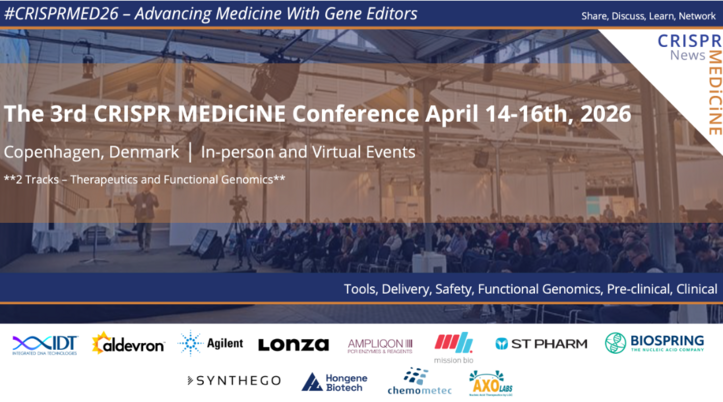CMN Weekly (20 January 2023) - Your Weekly CRISPR Medicine News
By: Karen O'Hanlon Cohrt - Jan. 20, 2023
Top picks
- CRISPR technology: A decade of genome editing is only the beginning. This review by authors at University of California Berkeley examines the origins and utility of CRISPR-based genome editing, the successes and limitations, and where innovation and engineering are needed. The authors describe advances in the development of CRISPR technology, and highlight specific examples in medicine and agriculture that show how CRISPR is already affecting society, with exciting opportunities for the future.
- Next up for CRISPR: Gene editing for the masses? CRISPR therapy to combat high cholesterol is one of MIT Technology Review’s 10 Breakthrough Technologies of 2023, and Verve Therapeutics started the first trial in this area last year. Read more about Verve's ongoing Phase 1b heart-1 trial for VERVE-101, a novel, investigational base-edited medicine designed to be permanently turns off the PCSK9 gene in the liver to reduce disease-driving low-density lipoprotein cholesterol, here and here.
Industry
- Inscripta® acquires Infinome Biosciences and Sestina Bio to advance sustainable biomanufacturing. The move, which was announced in a press release earlier this week, will bring Infinome's GenoScaler™ proprietary microbial strain-engineering platform and Sestina's data-driven approach for building and identifying strains with the right potential for commercialisation to Inscripta, which is developing innovative products through biomanufacturing.
- In a press release published earlier this week, bluebird bio announced the pricing of a $120 million public offering of common stock. bluebird intends to use the net proceeds of the offering to support commercialisation and manufacturing for its two approved gene therapies, ZYNTEGLO and SKYSONA, to accelerate future commercialisation activities for its gene therapy candidate lovo-cel for sickle cell disease, if approved, and to fund working capital and other general corporate purposes.
- Feldan Therapeutics announced this week that it has been awarded funding by cystic fibrobis foundation. The company, which is headquarted in Quebec City, Canada, is developing novel therapies based on its proprietary intracellular delivery platform, and the new funding will be used to pursue the development of the Feldan Shuttle technology as a pulmonary delivery agent for cystic fibrosis.
- Editas Medicine and Shoreline Biosciences have entered into a definitive agreement that will see Shoreline acquire Editas’ INK cell franchise and related gene-editing technologies. According to a press release published yesterday, Shoreline Biosciences, which is a private biopharmaceutical company developing next-gen cellular immunotherapies, will license Editas' proprietary SLEEK (SeLection by Essential-gene Exon Knock-in) and AsCas12a gene-editing technologies as well as acquire Editas' pre-clinical gene-edited induced pluripotent stem cell-derived natural killer cell programmes and related manufacturing technologies. The news comes following an earlier announcement this month that Editas is reprioritising its portfolio.
Research
- In an article published this week in Science Translational Research, researchers in the U.S. report using a multiplex epigenome-editing approach to reactivate the methyl CpG-binding protein 2 (MECP2) gene from the inactive X chromosome (Xi) in human embryonic stem cells (hESCs) derived from individuals with the X-linked neurodevelopmental disorder Rett syndrome (RTT). Among their findings were that neurons derived from methylation-edited RTT hESCs maintained MECP2 reactivation and reversed the smaller soma size and electrophysiological abnormalities, two hallmarks of RTT. The study demonstrates the potential of epigenome editing to treat RTT and potentially other dominant X-linked diseases.
- A team of scientists in China have investigated the therapeutic potential of a multi-modal extracellular vesicle (EV) system derived from human embryonic kidney 293 cells, carrying a tumour-specific nanobody and the immunostimulant interleukin-12 (IL12) using in vivo models of hepatocellular carcinoma. They found that CRISPR-Cas9-mediated knockout of integrin β1 in the HEK293 cells followed by CRISPR-mediated deglycosylation of the engineered EVs led to enhanced systemic exposure with reduced hepatic accumulation. The study findings were recently published in International Journal of Nanomedicine.
- In an article published yesterday in Angewandte Chemie International Edition, a team in China reports the generation of interally and externally (i.e. on the exosome membrane) engineered exosomes using CRISPR interference (CRISPRi). Following engineering of the tumour-associated macrophage (TAM)-specific peptide onto the exosome membrane, the team observed selective homing of the exosomes to tumour tissue and targeting to M2-like TAMs, which led to increased anti-tumour immunity and significant inhibition of tumour growth in a lung cancer model.
- A group of researchers in the U.S. has developed a CRISPR activation (CRISPRa) system based on a catalytically-dead Cas9 (dCas9) in the human disease vector Aedes aegypti, to transactivate target gene expression. Using dCas9 paired with a highly-active tripartite activator, VP64-p65-Rta (VPR) and synthetic guide RNA (sgRNA) complementary to a target promoter region, the team succeeded in overexpressing a positive transcriptional regulator of the Toll immune pathway known as AaRel1, which resulted in a significant suppression of dengue virus serotype 2 (DENV2) titers in the mosquito. This new system provides a novel tool to manipulate Ae. aegypti. The findings of this study were published yesterday in PLoS Pathogen.
Detection
- Group B Streptococcus (GBS) is a leading infectious cause of neonatal morbidity and mortality. To address the need for a rapid and sensitive detection protocol for GBS in pregnant individuals with premature rupture of membrane (PROM), a team in China has developed a combined recombinase polymerase amplification (RPA) and CRISPR-Cas12a approach. Using vaginal or cervical swabs from 179 individuals with confirmed PROM, the team assessed the clinical performance of their assay compared to culture-based matrix-assisted laser desorption ionisation time-of-flight mass spectrometry (culture-MS) real-time quantitative PCR. The assay could be completed within 35 min and the limit of detection was as low as 5 copies μL-1. Full details of the workflow and findings can be found in an article published yesterday in Annals of Clinical Microbiology and Antimicrobials.
Reviews
- Genetically modified cell spheroids for tissue engineering and regenerative medicine. Cell spheroids have been proposed as an ideal vehicle for gene delivery, and genetically-modified spheroids can enhance specific gene expression to promote tissue regeneration. This review discusses recent articles about genetically-modified spheroid cells and explains the fabrication, applications, development timeline, limitations, and future directions of genetically-modified cell spheroids.
- Detection Methods for Foodborne Viruses: Current State-of-Art and Future Perspectives. This review summarises and compares the currently used detection methods for foodborne viruses, including traditional electron microscopy and cultural isolation, immunoassay, molecular technology, biosensors, as well as emerging CRISPR-Cas-based detection methods.
- Gene Modulation with CRISPR-based Tools in Human iPSC-Cardiomyocytes. In this review, key developments involving the use of CRISPRi / CRISPRa (interference/activation) systems for functional genomics studies within cardiovascular research are discussed. The auhors also address the use of these methods with induced pluripotent stem cell (iPSC)-cardiomyocytes and the challenges in further translation of these techniques.
News from CRISPR Medicine News
- This week's clinical update looks at four ongoing clinical trials involving a gene-edited therapeutic candidate for the treatment of solid cancers. Read it here.
To get more of the CRISPR Medicine News delivered to your inbox, sign up to the free weekly CMN Newsletter here.
Tags
CLINICAL TRIALS
IND Enabling
Phase I
Phase II
Phase III
Recurrent or Progressive High-grade Glioma, (NCT06737146)
Sponsors:
Suzhou Maximum Bio-tech Co., Ltd.
Sponsors:
Suzhou Maximum Bio-tech Co., Ltd.
IND Enabling
Phase I
Phase II
Phase III
Advanced Peritoneal Malignancies or Abdominal Metastatic Solid Tumors, (NCT06912152)
Sponsors:
Zhejiang University
Sponsors:
Zhejiang University
IND Enabling
Phase I
Phase II
Phase III







